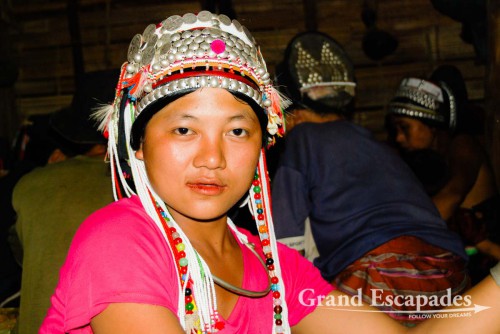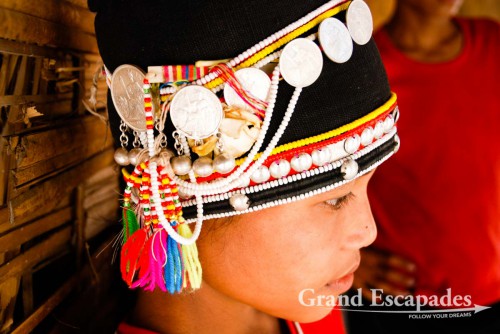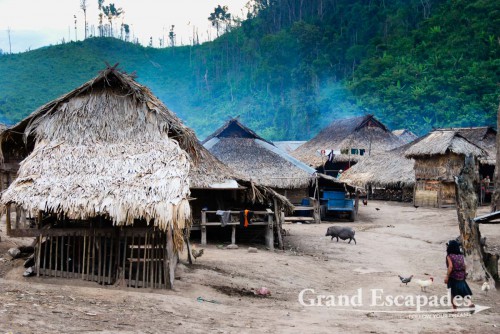We reached Ban Nam Lai in the late afternoon and to our surprise found our accommodation to be half a kilometer outside the village, which felt rather uninviting. After a quick wash in the small river, we went over. On the way, we passed a person taking a bath in the river, who told our guide that in the evening, a wedding would be celebrated in this village. We immediately asked if we could join the ceremony and our guide Pet said we were welcome.
Before we came to here, we heard several times that Laos today is what Thailand was 30 years ago. Well, what we witnessed this evening in a very remote Akha village of 260 inhabitants was more Neolithic Age than anything else, if you ignored the few bikes, scooters and some tiny solar panels that provide electricity for a few houses. Heidi had trekked in remote areas in northern Thailand 20 years ago and felt that here, in Ban Nam Lai, living conditions were a lot worse than in those villages she visited back then.
About fifty families live in huts made of wood and thatched roofs, surrounded by pigs, lots of piglets, goats, dogs, cats, chicken, duck and the excrements of all the animals mentioned. And dust… Simply everywhere! As often in a remote area, the many children were excited to meet us. Men would greet us in Lao with “Sabaidii”, but women, who by the way were all bare breasted, were very reserved. We felt very strange, like intruding into somebody’s home. For this reason, we only took photos of children, except later in the evening, when Lao Lao, a 40% proof rice whiskey, helped to break the ice.
With our guide, we practiced a few words in Akha: “jipatar” = toast to drink and “Yoh mue ma de” = thank you. Equipped with these two words, we emerged or were emerged in this Akha wedding ceremony, a very bizarre experience. Inside a hut, we witnessed various activities: the offerings of pig fat; the 17 year old bride chanting in a corner, the women sitting next to her watching passively; the men, drinking, smoking, preparing the offering and chasing the dogs from the hut, who tried to snatch the offerings.
The heat inside was intense and soon we were sweating profusely. Luckily, we were asked outside, where the drinking of Lao Lao began and food was put on the table, literally, only the rice came in a dish. We had no clue what was “served” and not in the least tempted because we had stuffed ourselves at our previous dinner. There was no escape though, we were fed by our neighbors who took great pleasure stuffing chopsticks full of food in our mouth and invited us permanently to have a drink. This meant to gulp down a shot of LaoLao, after you had looked at everyone at the table and said “Jiapatar”, which was greeted with a collective “Jiapatar”. We lost track of how many drinks we had, but it was not only a few… Except the bride’s sister who was serving the food, only men sat with us. Later, the newly wed couple circled the tables receiving small amounts of money and giving cigarettes and candies in exchange.
Then it was time for speeches and songs. Some of the men in the village sang quite beautifully. Shortly before midnight, while the alcohol was still flowing and the battery powered stereo playing the same songs over and over, we called it a night.




No comments yet.